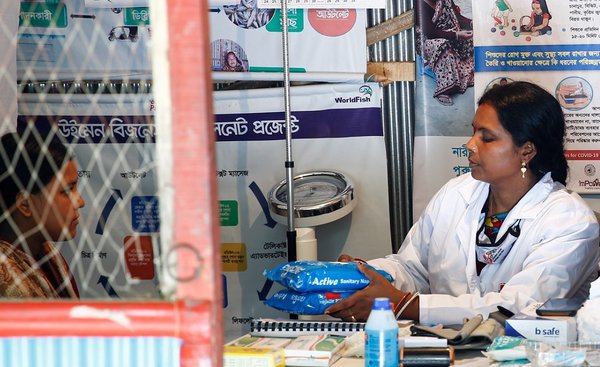- Share this article
- Subscribe to our newsletter
GIZ in Bangladesh – quick solutions instead of long trips
An accident on the main road in the mountain village of Noapara in south-eastern Bangladesh. A motorcyclist has injured his leg, and is bleeding heavily. Too heavily to take him to the nearest medical practice in the district capital.
Thankfully, Hitoshi Chakma, who runs a small business, is there to help. Using a mobile phone app, she contacts a doctor right away. Over the phone, he explains to her what to do: Chakma applies a pressure bandage to the injured man's leg, which quickly stems the bleeding.
In rural areas of Bangladesh, this kind of emergency is by no means unusual. Access to medical treatment is difficult in many places. Patients often have to travel long distances to reach medical practices or hospitals. During the COVID-19 pandemic, travel bans created further constraints.
The Women's Business Centres, a network of women entrepreneurs to which Chakma belongs, are providing digital and analogue services to the rural population to mitigate the effects of the pandemic. Deutsche Gesellschaft für Internationale Zusammenarbeit (GIZ) GmbH is supporting the network, which is funded by the German Federal Ministry for Economic Cooperation and Development (BMZ) and the European Union.
Rapid assistance for 27,000 patients
To improve healthcare in remote villages, the women entrepreneurs were trained to use mobile phones and an app to bring patients and doctors together for teleconsultations. The women book appointments for the patients and support them with questions during the consultation. After the appointment, they print out the prescriptions issued by the doctors on the app. This has already allowed them to provide medical advice to 27,000 people.
In further training sessions, the women learned how to use appropriate devices to perform preventive medical check-ups. They then tested 30,000 people for diabetes or high blood pressure. Using another app, the women entrepreneurs also keep an eye on the growth of babies and small children in order to prevent malnutrition.
Women's network makes farmers more crisis-proof
Healthcare was not the only area where the project filled gaps. The pandemic also paralysed the markets for agricultural and animal products – the main source of income for many people in rural areas. Veterinarians and agricultural extension officers were not available. This resulted in additional losses.
The women's network trained the village communities to grow climate-resilient vegetables. Farmers are now in a better position to avoid crop failures, and many have been able to reduce their production costs. At the same time, they can supply the population better with food. Thanks to the Women's Business Centres, they are now able to supply eggs and vegetables to shops in the larger villages and towns collectively – for fair pay and with low transport costs. For livestock farmers, the Women's Business Centres use an app to contact veterinary practices online. Almost 400 people have used the service so far.
Positive effects for the women entrepreneurs
The women in the network also benefit themselves. Being part of the network has changed Hitoshi Chakma's life: “I have earned a lot of money through the services we provide. This has strengthened my economic and social position,” says the 25-year-old. She wants to continue working as a micro-entrepreneur beyond the project.
Through her work at the Women's Business Centre, Chakma has learned how to use digital communication tools. With the help of YouTube videos, she has familiarised herself with topics such as animal husbandry and mushroom cultivation. With the income from the products she sells, Chakma now supports her family. As she puts it, “I am now an independent woman.”
(giz/wi)
More information:





Add a comment
Be the First to Comment